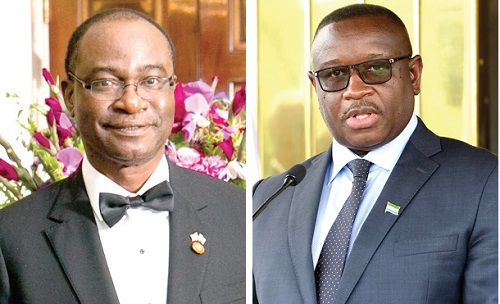
Sierra Leone votes in crucial presidential election
All eyes will be on Sierra Leone as they head to the polls to vote for a new president today, June 24, 2023.
Alongside the presidential poll, voters will also elect members of parliamentary and local council. Approximately 3.4 million Sierra Leoneans are expected to vote in the general election and it is expected to follow the peaceful and somewhat democratic nature of its four predecessors.
It will be the fifth presidential election since the brutal 10-year civil war two decades ago, from 1991 to 2002 which left tens of thousands dead, hundreds of thousands maimed, thousands displaced and destroyed the country’s economy.
Presidential candidates
Thirteen presidential candidates are competing to lead the country of 8.4 million people but experts say it is likely to be a two-horse race between incumbent President Julius Maada Bio, who is seeking re-election, and Samura Kamara, the head of the All People’s Congress Party (APC), Sierra Leone’s main opposition camp.
The winner of the election needs 55 per cent of the vote to clinch victory in the first round or it goes into a runoff within two weeks.
The last Parliament, dissolved on April 25, was composed of 132 directly elected members (MPs) and 14 paramount chief members of parliament (PCMPs).
The new Parliament, after today’s elections, will constitute 135 MPs and 14 PCMPs. Unlike the presidential election, the vote will be conducted under the district block proportional representation system as opposed to the constituency-based first-past-the-post system used since 2007. The election of PCMPs will also take place on June 24.
Vote
This week’s vote is expected to be a tight race, which will be a reverse of the 2018 presidential election that Bio at the time, representing the opposition party, faced Kamara from the then-ruling party, whom the former president had handpicked as his successor.
Bio, at the time, narrowly beat Kamara in a runoff by a margin of less than five per cent, mainly because of support in the southern and eastern districts. Kamara garnered support from the north and west regions.
As a former military head of state, Bio came to power promising to end rampant corruption. Analysts say that he had invested in improving education in the country and took steps to fight rampant corruption.
The country ranked 110 on Transparency International’s index in 2022, moving up from 129 when he took office. But the weak economy has drawn criticism, with Sierra Leoneans taking to the streets protesting widespread poverty.
Bio coined his current presidential campaign, “The People’s Manifesto 2023”, promising to “solidify gains” made during his tenure.
Times
“Despite the turbulent times globally, we have done the work in the past five years,” he said at his campaign launch in May, assuring his supporters of a “victory in the polls, with God on our side.”
Bio’s opponent, Kamara, a seasoned politician who served in various government positions, including as a foreign minister, is running for the presidency while facing corruption charges,
since 2021, of allegedly embezzling public funds from a renovation project in New York during his time as a minister. His case is set to be heard in court by mid-July. He’s hoping to catapult support by promising to fix the country’s economic woes.
Regardless of who wins the election, economic growth is expected to remain slow, bogged down by sluggish global expansion and a rise in domestic inflation, said Rukmini Sanyal, an analyst for the Economist Intelligence Unit, a research and analysis division of the Economist Group.
The new government will face the same macroeconomic challenges and so “the risk of social unrest” will continue over the near-term, Sanyal said. Public frustration over soaring inflation, widespread poverty and the high unemployment rate “will play a key role in eroding the incumbent (party’s) popularity,” she said.
Already, the Economic Community of West African States (ECOWAS) has sent a 95-member ECOWAS Elections Observer team to the country, which comprises 15 long-term and 80 short-term observers led by Dr Mohamed Ibn Chambas, a former Special Representative of the United Nations (UN) Secretary-General and the Head of the UN office in West Africa and the Sahel. The team has begun consultations with stakeholders of the electoral process.
Sierra Leone had witnessed two peaceful transfers of power from the ruling party to the opposition party. Bio, who was elected for a first term in 2018, has faced increasing criticism for the country's debilitating economic conditions, with several violent anti-government protests taking place in recent months.
Bio has been facing increasing criticism because of debilitating economic conditions. Nearly 60 per cent of Sierra Leone’s population of more than seven million are facing poverty, with youth unemployment being one of the highest in West Africa.
Multiple deadly anti-government protests rocked the country, with calls for Bio to step down. Fuelled by a rise in cost of living, the latest one in August, left dozens dead, including security forces.
Challenges
As of April, Sierra Leone, which has one of the world's weakest currencies, saw inflation rise to more than 43 per cent from a high of more than 41 per cent in March. With nearly 60 per cent of the country's population of more than seven million facing poverty and one of the highest rates of youth unemployment in West Africa, public frustration is growing.
The election also comes during a surge of regional political upheaval, with deadly clashes in Senegal, as well as military coups in Burkina Faso and Mali. Thus, Sierra Leone having a peaceful vote is of greater importance, analysts have said.
“We’ve seen this democratic backsliding in the region. So if Sierra Leone’s (presidential) election is free, fair and credible, it could be a bellwether for regional democracy,” Jamie Hitchen, a political analyst focused on Sierra Leone and an honorary research fellow at the University of Birmingham, said.
